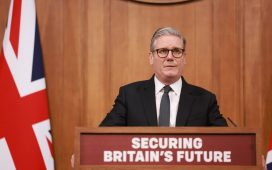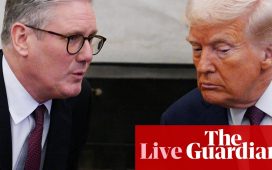Rishi Sunak is facing criticism after reports that a meeting between King Charles and the president of the European Commission was cancelled days before the announcement of an expected deal on the Northern Ireland protocol.
According to reports, there had been plans for an in-person meeting between the king and Ursula von der Leyen, as part of a trip to the UK to seal the deal on the Brexit trading arrangements.
Government sources denied Sunak was intending to use King Charles to endorse his much-anticipated deal to end the row with the EU over the NI protocol.
“It would be wrong to suggest the king would be involved in anything remotely political,” a government source told the PA news agency.
The mooted meeting on Saturday and plan to announce a revised pact, codenamed the Windsor agreement, were cancelled, according to reports, but hope remains for the announcement of an agreement on Monday after Sunak and Von der Leyen had “positive” discussions about the Northern Ireland protocol on Friday.
Buckingham Palace said it would not comment.
Sammy Wilson, the Brexit spokesperson for the Democratic Unionist party (DUP), said any consideration of involving the king was politically “naive”.
“Not only is the prime minister naive if that’s what he was planning to do, but this is a cynical use, or abuse of the king,” Wilson told Sky News on Saturday.
He said it would have meant “dragging the king into a hugely controversial political issue, not just in Northern Ireland but even within his own party”.
Conservative Eurosceptic and former business secretary Jacob Rees-Mogg told the Times the planned meeting with the king was “on the borderline of constitutional propriety”.
Lady Hoey, a Northern Irish Brexit supporter and former Labour MP, said any such meeting would have been “outrageous”.
Peter Kyle, the shadow Northern Ireland secretary, said Downing Street should have realised utilising the king would have “constitutional implications” and been “highly insensitive to the politics of Northern Ireland”.
“It certainly is nothing we should be involving His Majesty in,” he told Sky News.
No 10 said Sunak would spend the weekend speaking to “relevant stakeholders” as he looked to get a protocol deal over the line.
Downing Street said “intensive negotiations” with Brussels were still taking place.
The Irish taisoeach, Leo Varadkar, told reporters on Saturday the talks were “inching towards a conclusion”.
“Certainly the deal isn’t done yet, but I do think we are inching towards a conclusion,” Varadkar said.
“There is the possibility of agreement in the next few days but by no means guaranteed … There’s still a gap to be closed,” Varadkar said, adding there was ongoing engagement between the UK government and the European Commission.
after newsletter promotion
Varadkar, who played a key role when the protocol was agreed in 2019, encouraged London, Brussels and Northern Irish politicians “to go the extra mile” to help reach an agreement, saying the benefits would be “huge”.
The DUP is boycotting power-sharing in Northern Ireland in opposition to the protocol.
Wilson said his party would only accept a deal if EU law did not apply in Northern Ireland.
He told Sky News: “If the prime minster succeeds in getting that we will embrace it, but if he hasn’t succeeded in achieving that aim then as part of the UK we cannot accept it.”
The controversy blew up as the government confirmed it had no central database tracking regulatory divergence between Great Britain and Northern Ireland, an issue which goes to the heart of the DUP’s objections to the protocol.
David Jones, a leading member of the pro-Brexit Conservative party European Research Group, says there are now 500 pieces of EU legislation that apply in Northern Ireland but do not apply in the rest of the UK since Brexit came into force in 2020.
But the Europe minister, Leo Docherty, wrote to a House of Lords protocol committee on Friday to say there was no “single unit” in Whitehall monitoring the emergence of new EU laws, rules and regulations affecting Northern Ireland.
He told Lord Jay, the chair of the committee, that monitoring divergence was “a task which concerns and involves all government departments with relevant policy remits”.
He added: “I would note that impact assessments for UK regulatory proposals include cost/benefit analyses on the effects of any divergence. While no such impact assessments will be triggered where divergence arises via EU-led changes in its regulations, the processes of monitoring and explanatory memoranda will allow the government and affected parties to assess the effects.”
The EU and Downing Street said the prime minister and Von der Leyen would speak again in the “coming days”.
The pair have spoken three times in the past week, including holding face-to-face conversations on the fringes of the Munich security conference last Saturday.
It is expected that Sunak will also schedule a second meeting with the DUP, which has called for the end to the application of EU law in Northern Ireland, something that is almost certainly ruled out as this would require a complete rewriting of much of the protocol.
PA Media contributed to this report










